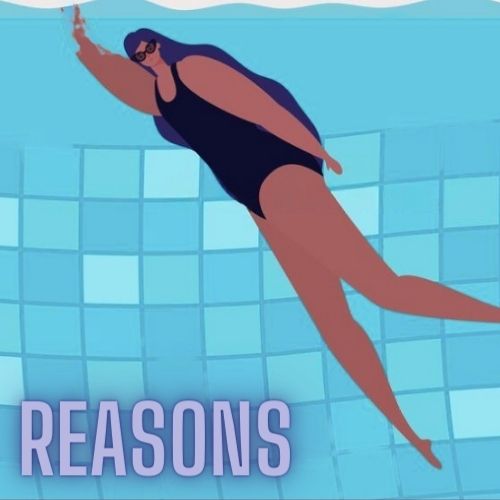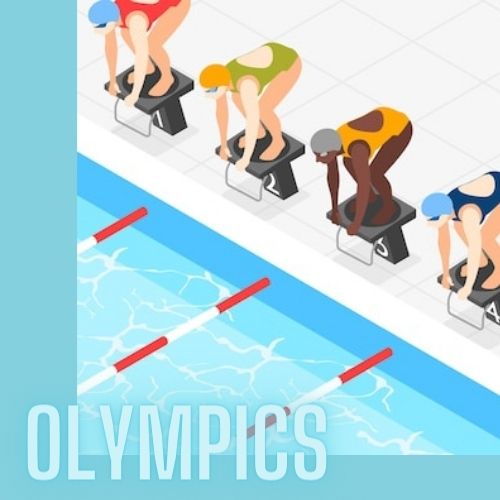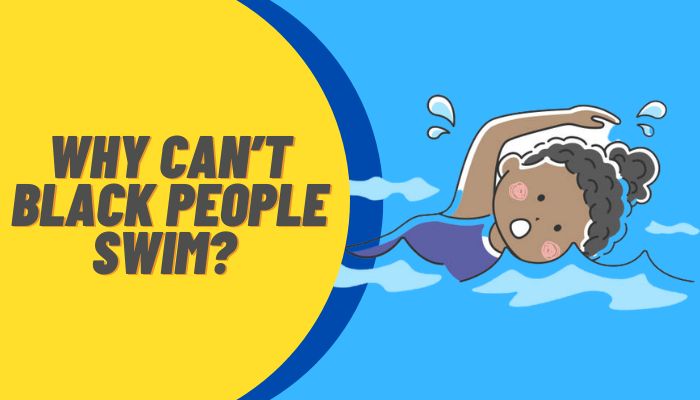The truth is, black people are not exposed to swimming as much as whites are, globally. As such, black people can’t swim as white people can, at least statistically.
In a survey in the US, almost 3,500 accidental drownings happen every year, almost 10 a day.
This is consistent with a statistic from the US Centers for Disease Control and Prevention, which shows that the fatal drowning rate among African-American children aged five to fourteen is three times that of white children.
A similar stark picture was seen in a 2010 study sponsored by USA Swimming.
Approximately 70% of African-American children polled stated they had little or limited swimming abilities. The low ability just meant that they could splash around in the shallow end. Another 12% stated they could swim but had “trained themselves.”
According to the survey, 58% of Hispanic children have little or limited swimming abilities. The figure for white children was only 42%.
Thus, the ideology that black people cannot swim is a misconception fueled by racial discrimination and stereotypes.
In this article, I’ll walk you through the reasons why black people can’t swim and what is being done to impede the situation.
Reasons why black people can’t swim

1. Fear
One major reason surrounding the situation why black people cannot swim is the fear factor. Black people dread drowning in the swimming pool; as a result, they made little effort to learn the skill of swimming.
Equally, those who have the slightest desire fear they could be physically injured during their swimming lessons.
A major encouragement to these fear or injury perceptions is the fact that black parents who can’t swim embolden the inability of their children to swim.
What they do not know, is that their perception could rather lead them and their children in drowning should they find themselves wanting.
2. Racism
Moreover, discrimination has also contributed to the astonishing figures of why black people cannot swim and has created a big challenge for black athletes.
Swimming rates in the United States were wealthy during two periods: the 1920s and 1930s, when leisure swimming became popular, and the 1950s and 1960s, when the idea of swimming as a sport truly took off.
The first boom saw the construction of over 2,000 new municipal pools across the country, but black Americans were generally and consistently refused admission to those pools.
As a result, while whites learned to swim, swimming never became a component of African-American recreational culture.
While segregation in northern US pools disappeared in the 1940s and early 1950s, many white swimmers reacted by leaving municipal pools and going to private clubs in the suburbs, where segregation was still maintained.
As a result, municipal pools became a low public priority, and because whites abandoned these public pools, there were no or few black swimmers to learn from.
However, during the racial riots of the 1960s, many cities began building pools in largely black neighbourhoods; however, the new pools were generally undersized, measuring only 20 by 40ft and 3.5ft deep.
The pool was not suitable for swimming, but attracted kids who would stand around splashing in the water. On the other hand, there was no determination to teach African-American children how to swim in these pools.
Even though many working-class or poor white children cannot swim for similar reasons, swimming has become associated with the privileged.
Swimming pools are seen as a privileged possession of the affluent and as a country club sport that only the wealthiest kids can enjoy.
Thus, black people have been left behind to learn how to swim for decades.
3. Appearance
Another major reason, even when blacks have the opportunity to learn to swim is the concern coronate water would have on their skin and hair. Black women straighten their hair with relaxing creams or they fix their weave-on, which typically needs no contact with water to remain straight.
Thus, many African-American women, if they go to the beauty shop and get their hair fixed, are not going to swim.
But this phenomenon does not stop non-black swimmers from spending time around pools and swimming environments.
4. Superstitious beliefs in Africa
In Africa, the situation is far worse. According to statistics, just 668 of Swim England’s 73,000 registered competitive swimmers identified as black or mixed-race in 2019.
According to Sport England’s 2020 Active Lives study, 95% of black adults and 80% of black youngsters in England do not swim.
In an era where mass human trafficking through enslavement began, the sea represented danger. Africans avoided going swimming. Parents frequently warned their children not to go near the water to avoid being apprehended.
To dissuade their children from going near the ocean, parents would often make up beliefs about the water being a location for “witchcraft,” “sea monsters,’ or instill dread of drowning, and many of these superstitions were handed down.
During this period, there were several reports of Africans escaping slave ships and swimming to safety. It is claimed that 80% of Africans who survived the slave trade and arrived in America could swim. The teaching of enslaved Africans in the Americas was then prohibited. Enslaved Africans in the Americas were then banned from teaching their children how to swim.
Water is particularly important in African cultural beliefs and is frequently included in creation stories. Traditional beliefs in aquatic spirits may also discourage some swimmers. In traditional African faiths, water spirits can represent both good and evil.
Water spirits, in particular, were perceived to exist and may have taken the appearance of snakes, mermaids, or a combination of the two. One such ghost is a mermaid known as Mami Wata or Mamba Muntu, who appears in various African traditional beliefs.
She is a pan-African water deity with a presence in the Americas (Latin America, the Caribbean, and African-American traditions). She is said to chase after swimmers and seduce them with materialistic or “capitalist” aspirations.
She is a divinity who is said to bring about both happy and unpleasant events in people’s lives. Many people still pay devotion to this divinity, and mermaid sightings are still reported. In Zimbabwe, the Shona identify her with rivers and pools.
As a result, superstition is a primary reason why Africans avoid swimming lessons.
The list of black Olympic swimmers is changing the narrative

Despite these scenarios, many black swimmers turned athletes are advocating for more black people to learn to swim, not just for the sport but for their confidence and safety.
The first black swimmer to win an individual Olympic medal was Curacao-born Enith Brigitha for the Netherlands in 1976, while the first to win gold was Suriname’s Anthony Nesty in 1988. Nesty beat Biondi by one-hundredth of a second in that 100m butterfly final in Seoul.
In 2004, Maritza Correia became the first black American to set an American and world swimming record, and the first black female to join the U.S. Olympic team.
Cullen Jones was the first black male swimmer to hold a world record in swimming, as a member of the United States 400 freestyle relay at the 2008 Olympics in Beijing.
In 2016, Simone Manuel became the first African American woman to win an individual Olympic gold medal in swimming, showing her power and strength in a monumental 100-meter freestyle.
And while Manuel is one of the best known African American swimmers, there are plenty of other athletes who are paving the way for others to follow.
Lia Neal is also a two-time Olympic swimmer and won a silver medal in 2016.
Conversely,
The ideology that black people cannot swim is a misconception perceived by politics and racial discrimination in the 1900s. However, the situation is attracting black successful swimming athletes who are influencing a change in attitude towards swimming in the black community.
Frequently Asked Questions (FAQs)
Can black kids swim?
In 2017, USA Swimming, the governing body for the sport of swimming in the U.S., found that 64% of African-American children have low or no swimming ability. And according to their data, black children and their parents are three times more fearful of drowning than white children and their parents.
What percentage of Africans can swim?
A recent study sponsored by USA Swimming uncovered equally stark statistics. Just under 70% of African American children surveyed said they had no or low ability to swim. Low ability This merely meant they were able to splash around in the shallow end. A further 12% said they could swim but had “taught themselves”.
What percentage of white Americans can swim?
Overall, the survey finds that more than half of all Americans (54%) either can’t swim or don’t have all of the basic swimming skills. Other key survey findings are that about one in three (33%) African Americans report that they can perform all five basic swimming skills, compared to 51% of whites.
Does race affect the ability to swim?
While recent national data from the USA Swimming Foundation show a 5-10% increase in swimming abilities among young people, children in minority communities continue to have disproportionately no/low swimming ability.
Why do so many Americans not know how to swim?
One reason could be aquaphobia, and a fear of water is a surprisingly common trait in the U.S. population. According to a 1998 poll conducted by Gallup, 68% of Americans are afraid of deep, open water, while 32% fear putting their heads beneath the water and 46% fear the deep end of pools.
Why is swimming a white-dominated sport?
Swimming became an integral part of white America’s recreational culture. Parents take their kids to these pools, and a generation of white Americans learns to swim. By contrast, there is no similar, self-perpetuated swimming culture developed in black American communities.
What percentage of white Americans can swim?
Overall, the survey finds that more than half of all Americans (54%) either can’t swim or don’t have all of the basic swimming skills. Other key survey findings are that about one in three (33%) African Americans report that they can perform all five basic swimming skills, compared to 51% of whites.
Who was the first black person to swim in the Olympics?
Who was the first swimmer of African descent to win an Olympic medal? Holland’s Enith Brigitha placed third at the 1976 Montreal Olympics in the 100-meter free (56.65) behind the German Democratic Republic’s Kornelia Ender (55.65 WR) and Petra Priemer (56.49). We now know that both East Germans were doped.
References
- Lee, Namju, and Jongkyu Kim. “A review of the effect of swim training and nutrition on bone mineral density in female athletes.” NCBI, 31 December 2015, https://www.ncbi.nlm.nih.gov/pmc/articles/PMC4886840/. Accessed 23 May 2022.
- Martin, Ellie. “Racial Disparities in Swimming: What Can We Do?” Swimming World, 5 January 2021, https://www.swimmingworldmagazine.com/news/racial-disparities-in-swimming-what-can-we-do/. Accessed 21 May 2022.
- Rohrer, Finlo, and Maude Warner. “Why don’t black Americans swim?” BBC, 3 September 2010, https://www.bbc.com/news/world-us-canada-11172054. Accessed 21 May 2022.
Read Related Articles:
- Why do Black People Have Big Lips?
- Why Do Black People like Hennessy?
- Why do Black People Wash Chicken?
- Why Do Black People Have Big Dicks?
- Why do Black People Sag Their Pants?
- Why Do Black People Have Big Noses?
- Why do People Wear Black to Funerals?
- Why Do Black People Have Yellow Eyes?
- Can Two White People Have a Black Baby?
- Why Do Black People Smell? A Myth or Truth!
- Why Do Black People Wear White to Funerals?
- Can Black People Get lice? Everything You Need to Know!
- Can Black People Have Red Hair? Facts And Misconceptions!
- Can Black People Get Hickeys? Everything You Need to Know!
- Can Black People Get Sunburn? Everything You Need to Know!
- Can Black People Have Blue Eyes? Everything You Need to Know!
- Can Black People Blush: A Fascinating Episode that will Make you Smile!

Utter drivel, blaming racism.
Well, I agree with you.
However, that may be the writers perspective considering her experience.
But you have a point.
Racism isn’t to blame for everything.
Thanks, mate.